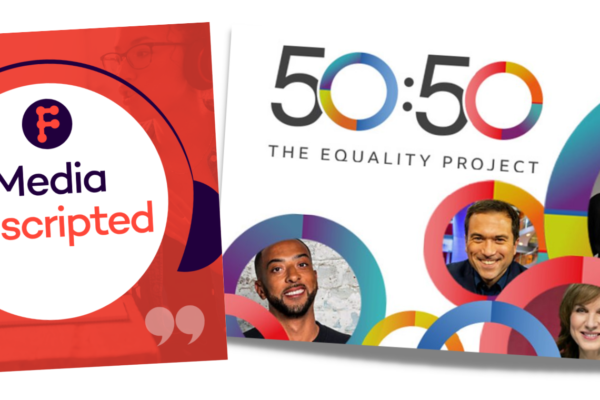Episode 3 of the Media Unscripted podcast available on general release
The third instalment of FIPP’s new Media Unscripted podcast, presented in partnership with PressReader, has now been published on general release. In this episode, Miranda Holt, External Partners Lead and Lara Joannides, Creative Diversity Lead at the BBC 50:50 Project discuss the nuts and bolts of the project and the incredible transformations it has engendered – both internally at the BBC and with the external content producers they work with.

One simple question
The BBC 5050 Project was launched by Ros Atkins in 2017 with one simple – but significant – question: could one news team, working on one show, achieve 50 per cent female representation in its content output over a one month period? Five years after its launch, it has now grown to encompass 690 teams across the corporation, as well as 100 partner organisations working in 27 countries around the world.
The beauty of BBC 50:50 is its simplicity: “It’s really focusing people’s minds,” Holt tells Media Unscripted host and industry journalist Charlotte Ricca. “Everybody gathers data on [gender equality], but the effective thing about 50:50 is that it’s absolutely immediate. It’s a very useful, dynamic target – everyone pores over the spreadsheet and thinks, ‘that’s where I need to improve’.”

Influencing policy
Holt and Joannides also talk candidly about how the project has emboldened teams at the BBC to say no when a woman expert isn’t available, which in turn is pushing companies to put forward women as guests on BBC programmes. “As it became official policy, it’s enabled us to push back and to say, well actually if you want to be on our programme, you need to find a woman. Suddenly, there’s this mandate,” says Holt.
Joannides talks about how the fast pace and extreme pressure of deadlines in newsrooms, for instance, have historically led those in charge to call upon the same (often white male) experts over and over again – rather than going the extra mile to find an equally or better qualified woman, person with disabilities or candidate of colour.
Now, that extra effort is paying off, as the mindset shift set in motion by BBC 50:50 is “actually making our stories a lot better,” explains Joannides. “It’s a combination of trying to change the world, yes, but also just changing habits.”
Going beyond equal representation of women and men, BBC 50:50 is also striving for 20 per cent ethnic minority representation and 12 per cent people with disabilities across its internal programmes and outside partnerships.
You can listen on Spotify here.








